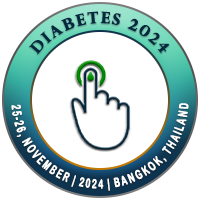
Barnali Ray Basu
Surendranath College, IndiaTitle: Does Dual impact of Insulin Resistant and Vitamin D Deficiency Worsen the Disease Severity?-A Case Control study on PCOS
Abstract
In the last two years of COVID pandemic era, people become more sedentary and homebound that might exaggerate two detrimental features of lifestyle diseases - Insulin Resistance (IR) and Vitamin D deficiency (VDD). IR is one of the key features of Polycystic Ovary Syndrome (PCOS) and is also considered as a potential contributor to Metabolic syndrome (MetS), Type-2 diabetes, Cardiovascular disease, Stroke, and even Carcinogenesis. VDD is also a well-evidenced phenomenon that can upregulate IR, hyperandrogenism, and dyslipidemia in PCOS. In our case-control study, it has been found that both the subject and control group have VDD but the PCOS is manifested in the individuals possessing both IR and hyperandrogenism or any one of them as comorbidity. It has been also found from the ROC (Receiver Operative Curve) that the PCOS-IR group shows more sensitivity to developing dyslipidemia than their non-IR counterpart. The results show a negative correlation of Vitamin-D and IR with C-reactive Protein (CRP) which is the most acceptable biomarker of chronic inflammation within the physiological system. In short, PCOS patients with IR become more prone to develop dyslipidemia which can negatively impact their cardiometabolic status and inflammatory state within the system. With the further influence of low Vitamin-D status, these factors exacerbate the phenotypic manifestations of PCOS. IR along with its other upregulators might be the central player of controlling the degree of severity of PCOS etiology and also one of the determining factors of the disease prognosis. Importantly, PCOS does not just have reproductive consequences but it is also associated with metabolic dysfunction, central to which IR, and this profile has implications for long-term health issues. Moreover, PCOS is a polygenic and multifactorial syndrome and manifested differentially in different ethnic populations. Hence, to understand the crosstalk of IR, VDD, and hyperasndrogenism the ethnicity-based genetic study in association with biochemical and clinical features are in dire need.
Biography
Barnali Ray Basu has completed her Ph. D in 2007 from Biochemical Engineering Division, Department of Chemical Engineering, University of Calcutta, Kolkata, India. She did her Bachelors and Masters in Human Physiology from University of Calcutta with specialization in biochemistry. A committed, determined and self-motivated faculty with 18 years of teaching experience in System Physiology, Molecular Biology, Genomics, Endocrinology, Neurophysiology and Stress Physiology. She has 15 years of research experience in diversified field in Biotechnology (like waste management, strain development, fermentation biotechnology, bioleaching etc.) and Physiology (nutritional biochemistry, anthropometric survey, stress physiology of human subject etc.) For the last few years, she has concentrated her field of research on genetics of diseases, stress physiology and lifestyle diseases.

